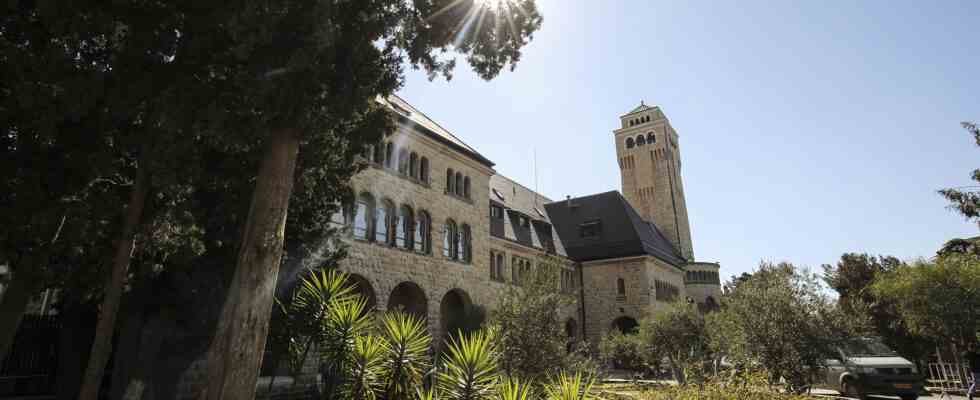Europe Magazine
Status: 05/21/2022 1:30 p.m
East Jerusalem’s Auguste Viktoria Hospital is the last hope for many Palestinian cancer patients. But the budget also depends on EU funds – and they are blocked. This also appalled many EU ministers.
“Look, the can is empty,” says Haya Mutiaa and reaches out to Dr. Yussef Hamamre handed the pill box to her with tears in her eyes. The 37-year-old Palestinian suffers from breast cancer. Her treatment has been interrupted for four months.
because dr Yussef lacks the money for her vital medicines. “She now has metastases in the brain and bones,” explains the oncologist. “Without treatment, she probably has less than a year to live.”
An ethical dilemma
Every day, the head of the outpatient cancer ward at Auguste Viktoria Hospital faces an ethical dilemma: “I have to make triage decisions every day and determine who can be treated tomorrow.”
Because the pharmacy in the Auguste-Viktoria-Hospital is emptying. Since September, doctors have had to turn away more than 500 patients and suspend many treatments.
The cancer hospital in the Arab east of Jerusalem is the last hope for many. Only here can Palestinians from the occupied West Bank and Gaza receive chemotherapy and radiation therapy.
EU payments are missing
“We’ve never had to decide from day to day which patients we can treat,” says Sieglinde Weinbrenner. She represents the Lutheran World Federation, which runs the hospital. Financial bottlenecks are a chronic problem. But the situation is dramatically aggravated by the lack of EU payments.
Of the around 200 million euros in EU aid for the Palestinian Authority, 13 million are earmarked for East Jerusalem hospitals. Sieglinde Weinbrenner is now missing about a quarter of her budget.
For a long time it was said from Brussels that the money would not be paid out for “technical reasons”. It was only by chance that she found out that there was a political discussion behind it.
The entrance to the Auguste-Viktoria-Hospital leads back to Wilhelmine times. Today it is in dire need of EU funds.
Image: picture alliance / AA
An EU Commissioner blocked
The reason for the missing payments lies in Brussels. And it has nothing to do with the hospital, but with Palestinian textbooks. A controversial topic.
EU Commissioner Olivér Várhelyi, who is responsible for EU support, calls for their revision. Some passages in it are anti-Israel. The books are constantly being revised. The Hungarian commissioner continues to block EU aid for the Palestinian territories and thus also the earmarked money for the cancer clinic.
Many EU member states are also outraged by this. Luxembourg Foreign Minister Jean Asselborn is demanding that the money be released. It’s about helping families “who really need our money”.
Asselborn refers to “19 EU foreign ministers who say: We have to maintain our credibility”. But so far there is nothing to suggest that Várhely will change his mind. And President Ursula von der Leyen’s spokesman also repeatedly avoided questions from EU journalists for many minutes on Friday.
EU Commissioner Várhelyi is withholding the funds and is calling for Palestinian textbooks to be revised.
Image: REUTERS
Decision at von der Leyen
Sieglinde Weinbrenner from the Lutheran World Federation fears dramatic consequences. “It’s such a traditional hospital and I just don’t want to be the one who has to close it,” she says, struggling to say the words.
From her office on the Mount of Olives you can see the golden dome of the Dome of the Rock. Kaiser Wilhelm II had the imposing Auguste-Viktoria building erected – on one side the view extends to Jerusalem’s old town and on the other to the Dead Sea.
Weinbrenner is now hoping for a decision by Commission President Ursula von der Leyen that the funds will be released. “She is a doctor herself and knows what it means when cancer treatments are interrupted.”
You can see this and other reports in Europamagazin – on Sunday at 12:45 p.m. in the first.

